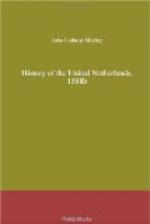During the winter, spring, and summer of 1588, while the Duke—in the face of mighty obstacles—was slowly proceeding with his preparations in Flanders, to co-operate with the armaments from Spain, it would have been possible by a combined movement to destroy his whole plan, to liberate all the Netherlands, and to avert, by one great effort, the ruin impending over England. Instead of such vigorous action, it was thought wiser to send commissioners, to make protocols, to ask for armistices, to give profusely to the enemy that which he was most in need of—time. Meanwhile the Hollanders and English could quarrel comfortably among themselves, and the little republic, for want of a legal head, could come as near as possible to its dissolution.
Young Maurice—deep thinker for his years and peremptory in action—was not the man to see his great father’s life-work annihilated before his eyes, so long as he had an arm and brain of his own. He accepted his position at the head of the government of Holland and Zeeland, and as chief of the war-party. The council of state, mainly composed of Leicester’s creatures, whose commissions would soon expire by their own limitation, could offer but a feeble resistance to such determined individuals as Maurice, Buys, and Barneveld. The party made rapid progress. On the other hand, the English Leicestrians did their best to foment discord in the Provinces. Sonoy was sustained in his rebellion in North Holland, not only by the Earl’s partizans, but by Elizabeth herself. Her rebukes to Maurice, when Maurice was pursuing the only course which seemed to him consistent with honour and sound policy, were sharper than a sword. Well might Duplessis Mornay observe, that the commonwealth had been rather strangled than embraced by the English Queen. Sonoy, in the name of Leicester, took arms against Maurice and the States; Maurice marched against him; and Lord Willoughby, commander-in-chief of the English forces, was anxious to march against Maurice. It was a spectacle to make angels weep, that of Englishmen and Hollanders preparing to cut each other’s throats, at the moment when Philip and Parma were bending all their energies to crush England and Holland at once.




